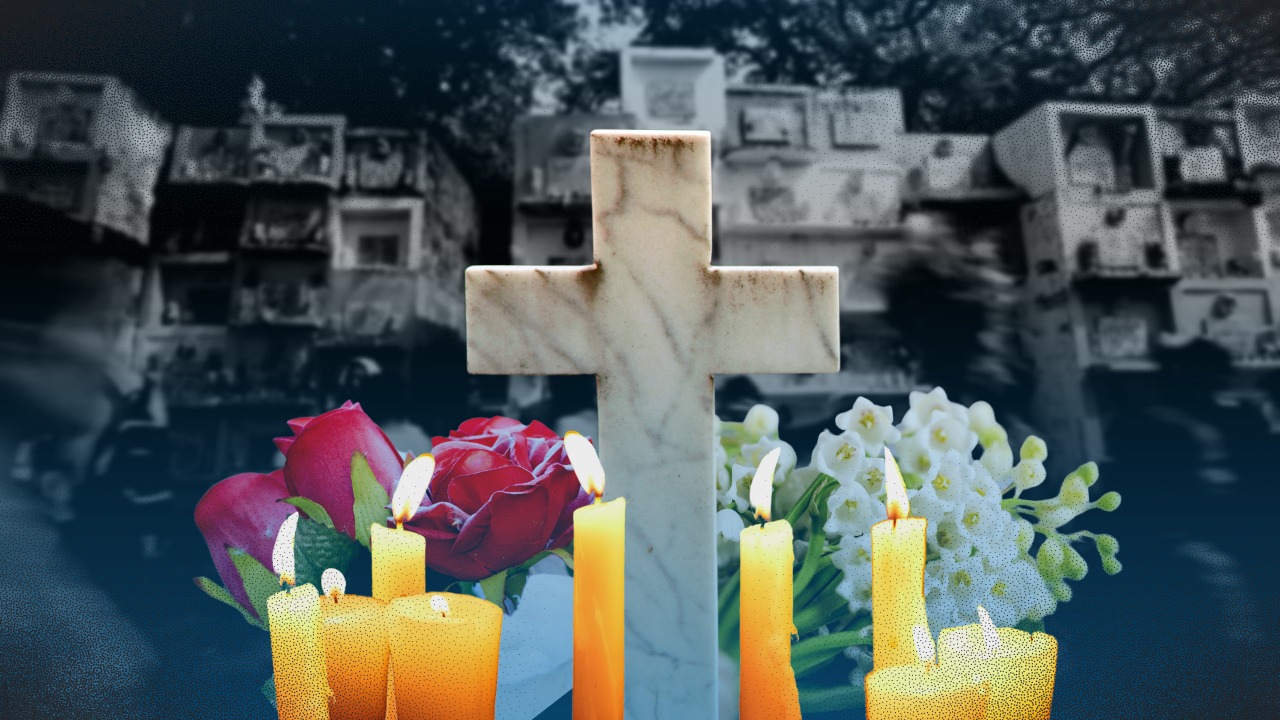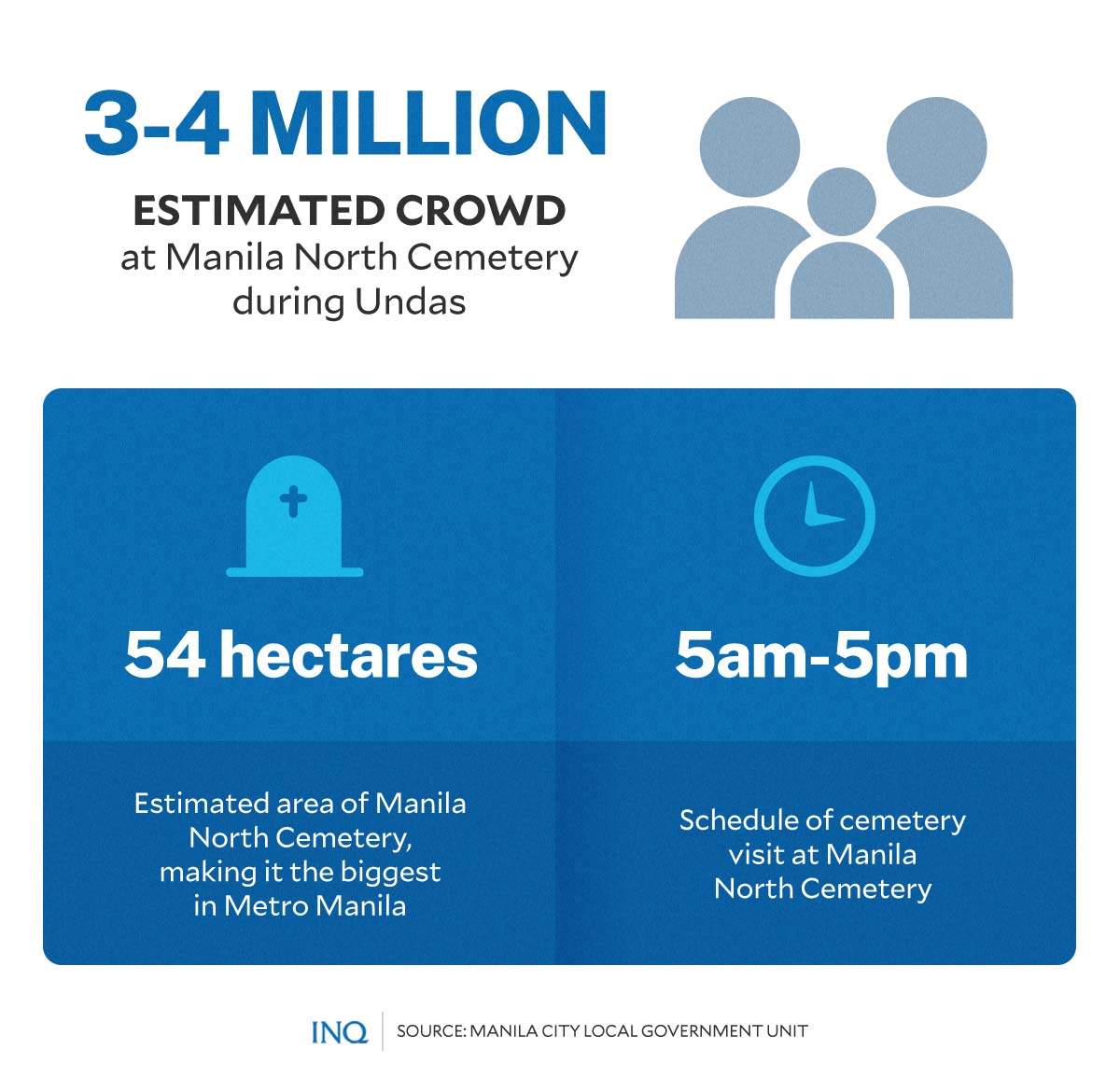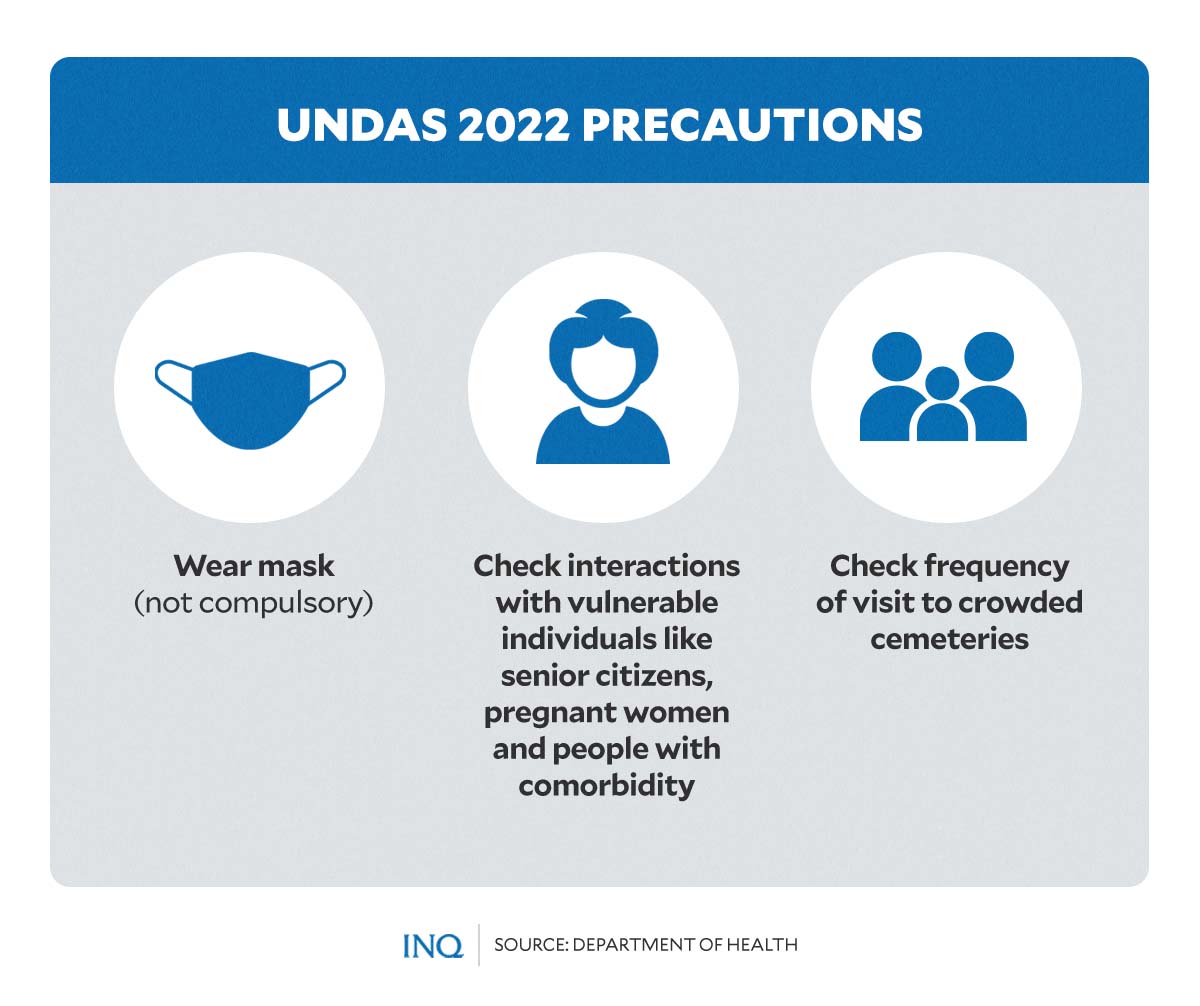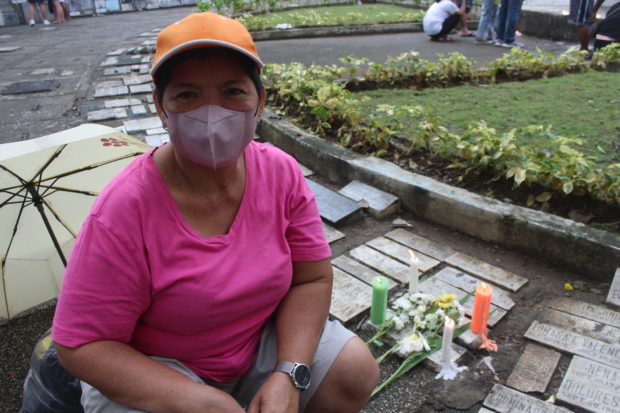Keeping Filipinos’ Undas traditions alive
MANILA, Philippines—Cemeteries all over the country have started to come to life again after two years of being closed to the public due to the COVID-19 pandemic, as thousands of Filipinos visit their departed loved ones striving to keep their Undas traditions alive.
Visiting cemeteries and columbaria on All Saints’ Day and All Souls’ Day—Nov. 1 and 2—has been a permanent fixture of Undas tradition among many Filipinos.
Families gathering in mausoleums, people lighting candles and leaving flowers on cement graves, and rows of vendors selling candles and flowers. These are the usual scenes every Undas in the Philippines.
However, due to the COVID-19 pandemic, cemeteries nationwide were closed in 2020 and 2021 to prevent the transmission of the deadly virus—a two-year physical and social distancing between the living and the dead.
This year, many cemeteries and columbaria have finally opened their doors, allowing the public to not only visit the dead but also to relive and preserve their own Undas traditions that are often based on religious teachings and the Filipino’s fondness for festivity.
Article continues after this advertisementAt the Manila North Cemetery, where a crowd of 3 to 4 million was expected to visit for Undas this year, a few individuals shared with INQUIRER.net what it felt like to return after two years and how some of them try to preserve generations-worth of family traditions.
Article continues after this advertisementREAD: Rain or shine, Filipinos flock to cemeteries for All Saints’ Day
Back again after 2 years
Visiting the cemetery has always been part of Gigi de Guzman and her family’s Undas tradition. As a child, she used to tag along with her grandparents whenever they went to the Manila North Cemetery every November 1.
“It started with our grandfather and grandmother, we then got used to doing it, so we continued to practice [the tradition] as we got older,” De Guzman told INQUIRER.net in Filipino.
“We never pass [up the chance] to visit here. Even when there are storms, we still go here,” she added.
When news broke out about the closure of cemeteries amid the pandemic, she felt extremely sad, knowing that she would not be able to visit her late parents and son.
When asked how it feels to go back and visit her departed loved ones again after two years, she immediately answered with a single word: “happy.”
“I’ve been waiting for this for a long time. That’s why I was so excited to go here again. We’ve been here since 5 am […] until they ask us to leave, we will stay here,” De Guzman, accompanied by some relatives, said.
According to the Manila Public Information Office, the Manila North Cemetery—along with all public cemeteries in the city—are open from 5 am to 5 pm. On October 31, many visitors were barred from entering the cemetery past visiting hours.
READ: Undas 2022: What to keep in mind when joining crowds in cemeteries, columbaria
COVID shakes up customs
Since the threat of COVID-19 still exists, the Department of Health (DOH) reminded the public to be careful and assess individual risks in deciding whether to wear face masks.
The health department also stressed that aside from assessing risks in the surroundings, those who plan on visiting cemeteries should assess personal risks.
These include the frequency of interactions with other people, how often they would go to crowded areas and if they are in close contact with vulnerable individuals like senior citizens, pregnant women and those with comorbidity or pre-existing illness.
READ: DOH reminds public to be careful during ‘Undas’
As part of precautionary measures against COVID-19, the City of Manila prohibited children 12 years old and below and unvaccinated individuals from entering Manila North and Manila South Cemetery.
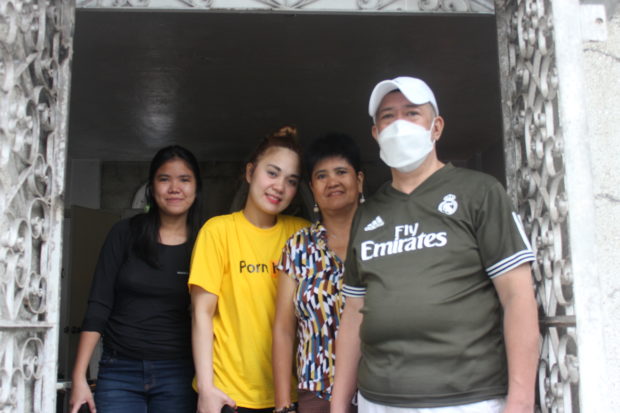
Camella Damian, June David, and their relatives pay a visit to their late loved ones. PHOTO CRISTINA ELOISA BACLIG
Filipinos, who are known to be family-oriented, often have reunions in cemeteries every All Saints Day and All Souls Day. For some, the restrictions led to changes in the way they practice their Undas traditions.
“Since 2010 up to 2018 [our family always] have reunions here [in the cemetery]. But ever since the pandemic, we no longer do it,” Camella Damian said.
“We are still in a pandemic, so [all we can do now] is to light candles,” she added.
Candles for the departed
Aside from visiting the dead, offering prayers, and placing food and flowers in front of altars or on graves, one of the most common Filipino traditions during the observance of All Souls’ and All Saints’ Days is lighting candles.
READ: Offering food to the dead shows close family ties of Filipinos
In a predominantly Catholic country, such as the Philippines, candles are usually lit for prayer intentions. For others, the act of lighting a candle helps drive away any evil spirit.
During Undas, many light up candles as a form of offering or sacrificial gift for departed loved ones.
“Some said it serves as light or guidance [for the souls of the departed] so they can enter Heaven,” said De Guzman.
For Marieta Somer, candles should be lighted not only for relatives and friends who died but also for lost souls who seek to be remembered every Undas.
“It’s for our departed loved ones and the forgotten souls,” she said.
Those who are unable to visit cemeteries usually leave burning candles by the front door every November 1 and 2—a practice that has become the go-to Undas tradition for many Filipinos during the past two years due to the pandemic.
Keeping Undas traditions alive
The many versions of Undas traditions practiced by Filipinos, above all else, serve as a way to remember and honor their departed loved ones.
LOOK: As night came, residents in Isabela, who went to cemeteries for Undas, start the observance of a long-held tradition to remember the dead on the eve of All Souls’ Day: the “lualo and atang,” which means prayer and offering for the dead. @inquirerdotnet pic.twitter.com/LARYVHbKt1
— Kurt Adrian Dela Peña (@AdrianINQ) November 1, 2022
“For us, as part of our tradition, we honor the dead—especially our parents—since they are the ones who gave life to us,” said Leonora Lorenzo, who visits her family’s mausoleum every year except during the first two years of the pandemic.
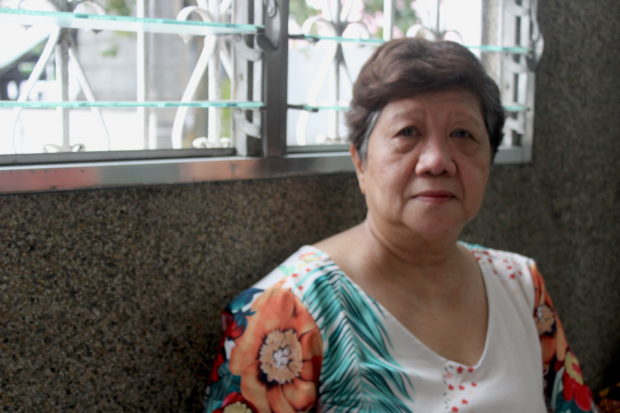
Leonora Lorenzo visits her family’s mausoleum, where her parents were buried, on All Saints’ Day. PHOTO CRISTINA ELOISA BACLIG
“They also left us with a gift called life. In return, we respect them in every way that we can, such as visiting them during Undas and offering flowers, candles, and prayers,” she added, speaking in Filipino.
However, for Somer, who went alone to visit her parents’ graves, some of the common Undas traditions are slowly being lost or forgotten by the younger generation.
Already a senior citizen, Somer said she worries that some young people will no longer practice the traditions practiced by many generations every All Saints’ and All Souls’ Day.
“When we’re gone, I don’t know if they would still continue these traditions,” she said.
Somer is among the thousands of Filipinos who lease an “apartment tomb” for their deceased relatives and pay a five-year lease that costs P5,000.
When the lease contract expires, and the living relatives choose not to renew the contract—in most cases because they could no longer afford it—the remains or bones of their loved ones will be dug up and transferred to other cemeteries or buried in mass graves.
READ: Dying poor: Endless emotional, financial agony for families
The financial burden of maintaining their relatives’ graves, according to Somer, adds to the uncertainty of preserving her family’s annual Undas traditions.
“Those who have mausoleums, their families can bond there and visit together every year. They can pass their traditions to the younger generations—their children and grandchildren. Unlike us who only rent apartment [graves], when they clear this up, we have nothing left to visit,” Somer said, speaking in Filipino.
“When I die, I don’t know [if they will continue our traditions]. I let them decide if they want to [keep it alive],” she added.
Facing a similar problem, Crispulo Mellendrez said he encourages younger members of the family to continue their Undas traditions.
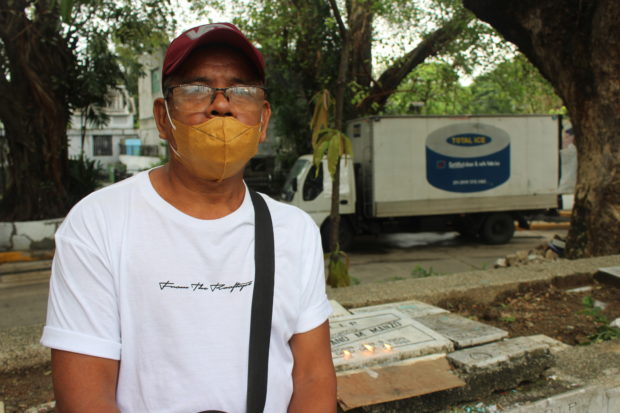
Crispulo Mellendrez visits his departed parents and grandparents at the Manila North Cemetery. PHOTO CRISTINA ELOISA BACLIG
“I always tell them that when we reach the age when we can no longer go [to the cemetery], they should go on our behalf and visit the graves of their grandparents,” he told INQUIRER.net.
June David said they make an effort to bring younger members of their family when visiting the cemetery so that they, too, can carry the tradition.
Making a living
During Undas, many vendors who make a living out of selling offerings for the dead roam around cemeteries—hoping to sell enough to feed their families for a day.
Arlene Malilin, an employee who works part-time as a vegetable and fruit vendor, tried selling flowers for the first time for Undas this year. She said she decided to make use of her free time during the two-day “unpaid” holidays to earn extra income for her family.

Arlene Malilin tries to sell flowers to cemetery visitors for the first time. PHOTO CRISTINA ELOISA BACLIG
“You really need to take risks. If you don’t lower your prices, [people will buy from] others who offer low prices. One peso or two peso profit is enough, otherwise, the flowers will not sell and will wilt,” she explained.
Laura Anuncicion—a longtime vendor of candles every Undas—said it is tough to sell and earn money, especially because vendors are no longer allowed to sell inside Manila North Cemetery.
To add insult to injury was the price increase in candles and flowers, which she and her nephew tried to sell this year.

Candle vendor Laura Anuncicion smiles to the camera, hoping to sell and earn enough this Undas. PHOTO CRISTINA ELOISA BACLIG
“I can’t stay and sell here for a long time, too. I am a PWD (person with disability), and I can’t move my leg properly. I also already had a stroke twice. That’s why I’m really struggling to sell,” she added.
In 2019, just before the pandemic closed cemeteries everywhere, the City of Manila implemented the no-vendor policy inside the Manila North Cemetery.
READ: No-vendor policy reduces number of people at Manila North Cemetery on Oct. 31
RELATED STORY: All Souls’ Day: Why do we pray for the dead?
TSB
For more news about the novel coronavirus click here.
What you need to know about Coronavirus.
For more information on COVID-19, call the DOH Hotline: (02) 86517800 local 1149/1150.
The Inquirer Foundation supports our healthcare frontliners and is still accepting cash donations to be deposited at Banco de Oro (BDO) current account #007960018860 or donate through PayMaya using this link.
